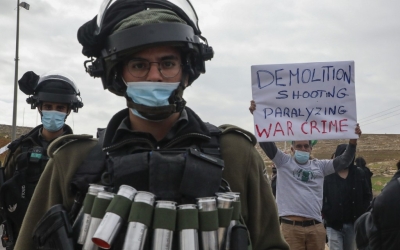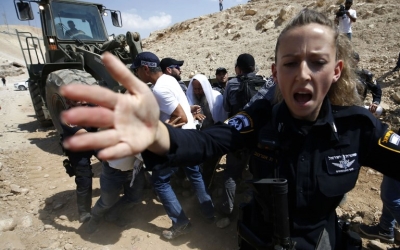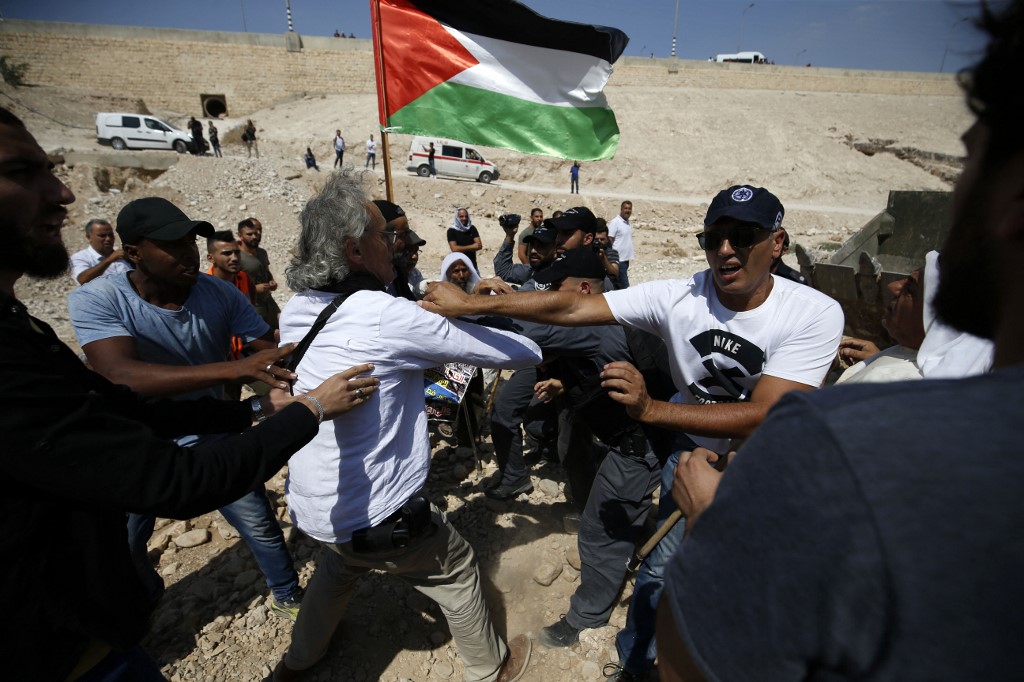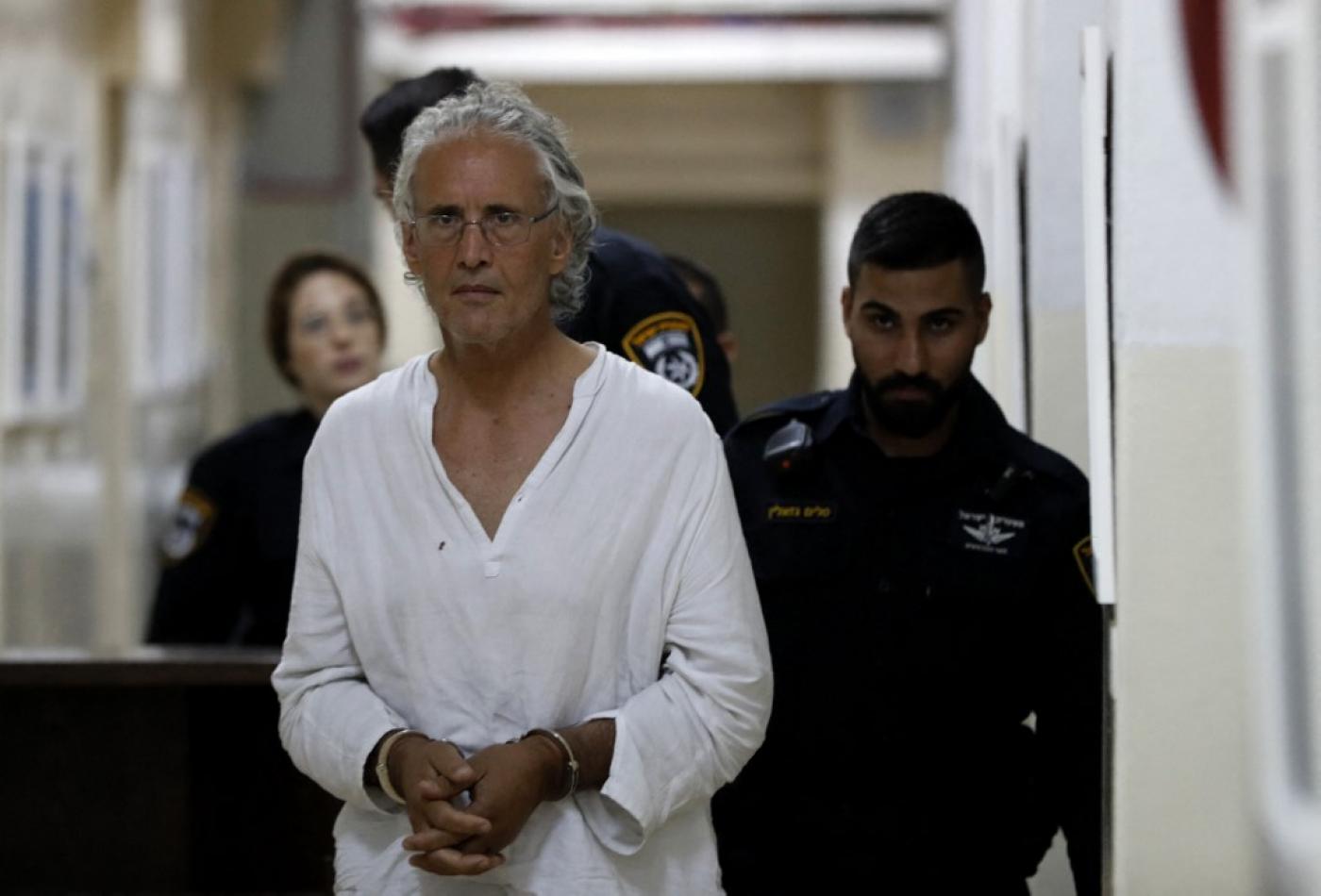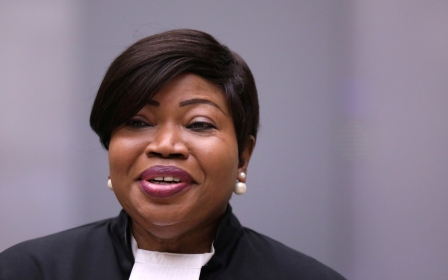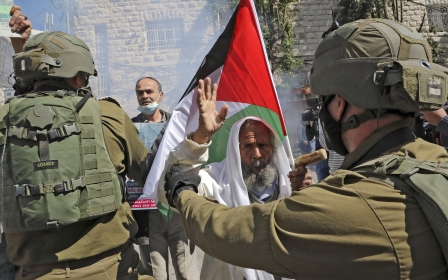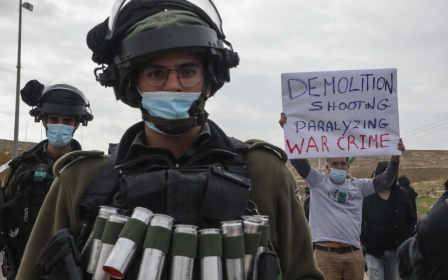Solidarity and a sting: How one complaint to the ICC against Israel got off the ground
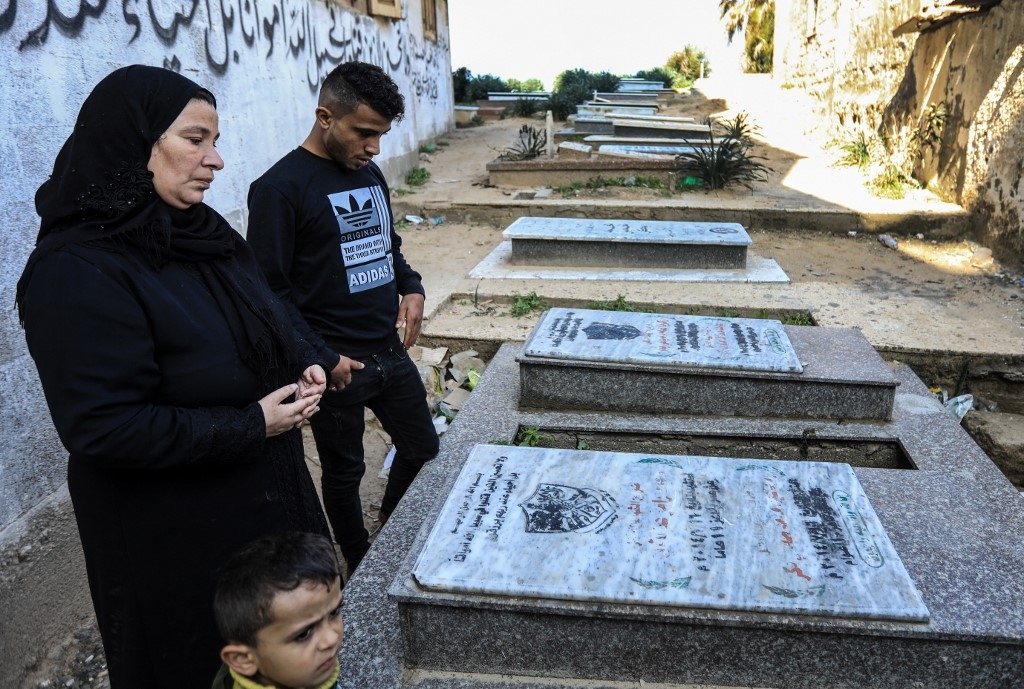
A recent Zoom event hosted from New York to discuss the International Criminal Court (ICC) investigation into alleged Israeli war crimes was hacked by supporters of Israel, who did their best to shut down the public meeting.
"It was hacked to the extent that participants' names were taken - I don't know how they do it - and then they started yelling out obscenities, that we're all antisemitic and so forth," said French-American lawyer Frank Romano, who was the guest speaker at the meeting.
New MEE newsletter: Jerusalem Dispatch
Sign up to get the latest insights and analysis on Israel-Palestine, alongside Turkey Unpacked and other MEE newsletters
Romano, who brought a legal case against Israel to the ICC in late 2019, was there to discuss the impact of the court's recent decision to investigate possible war crimes by Israel and Palestinian factions since 2014.
As a veteran solidarity activist, he had been to Israel and Palestine many times, been arrested and detained, and was last deported from Israel in 2018. Verbal and physical abuse and online attacks are par the course.
"You get people spitting at you, throwing things at you, trying to get the police to arrest you. I'm talking about being in Hebron, and Qalandiya, at checkpoints, in those kind of central conflict areas."
As a citizen of France and the US, as well as being a veteran of anti-occupation protests in the Israeli-controlled West Bank, Romano knows the risks he took aren't comparable to those faced by Palestinians who try to resist occupation. Thousands are in prison. Many have been killed.
Romano, a member of the California and French bars, and a law professor at the University of Paris, never set out to use his training as an international lawyer to bring a case that could ultimately see Israeli leaders and military commanders potentially facing war crimes charges in the Hague.
On the run
Romano's own submission to the case followed a period of research in Ramallah under the auspices of the Palestinian Authority (PA) in 2018, where he began drafting a legal case of war crimes while himself a fugitive from the Israeli authorities.
Romano had been arrested in September 2018 after standing in front of an Israeli bulldozer that was about to demolish the homes of Bedouin Palestinians in the village of Khan al-Ahmar in the occupied West Bank.
The community on the eastern slopes of Jerusalem in Israeli-controlled Area C has long been a site of protests against repeated demolitions of structures belonging to the Jahalin tribe, a Bedouin family expelled from the Naqab desert, also known as the Negev, during the 1948 Arab-Israeli war.
"On 14 September 2018, I was taken to Moscovia," said Romano, referring to the notorious Israeli police compound in West Jerusalem used mainly for interrogating Palestinians.
"Inside the prison was very tough. I was placed in a cell with a group of crazy prisoners." He had asked to be placed with Palestinians, but he was refused by guards because, they said, he was a foreigner.
When the prisoners, whom the lawyer understood to be Jewish, asked why he was there, they grew angry. "They were saying: 'You must work with al-Qaeda, you must hate Jews.' Four of them attacked me, one of them stabbed me with a sharp object. I pushed away and yelled at the guards."
Romano was placed in solitary confinement and eventually moved again. "I was supposed to go to court [in Jerusalem]; instead I was taken to the airport, and they got me in a military facility, where I was presented with two charges from a military court."
Military court
Israeli military courts are usually reserved for Palestinian prisoners, while others are tried in civilian courts.
At the airport, a fellow prisoner who had managed to smuggle in a phone let Romano call his lawyer. "My lawyer was standing in front of the judge in Jerusalem. They wanted to deport me."
The police had told the judge that Romano had been released, and that he was on his way to court. In fact, he was still at the airport.
'I knew they were never going to let me back into Palestine, so I decided to go underground'
- Frank Romano
"The judge was livid, and ordered the police to bring me to Jerusalem within one hour," Romano said, adding that the judge was so upset about his beating that she acquitted him almost immediately.
Romano was told to leave the country within 10 days. But he had other plans.
"I had my plane ticket, I was supposed to return to France to start teaching. The police when they finally released me told me I could never go back to Khan al-Ahmar.
"I knew they were never going to let me back into Palestine, so I decided to go underground in Ramallah just to continue working with the Palestinians."
Hired by the PA
After his release by the Israeli police, he fled to Ramallah in the occupied West Bank. With time on his hands, he offered his services to the PA to begin work on legal complaints over Israel's rights violations in Khan al-Ahmar.
"Since I couldn't do much for the very first time, I started working on the legal side. I'm an international lawyer, and I teach at the University of Paris, but first of all I'm an-in-the-streets, in-your-face activist."
MEE has verified that Romano was paid for his work at the PA public prosecutor's office on the Khan al-Ahmar case, on recommendation from the PA's attorney general.
He was also assisted on preparing the framework for a legal brief for an ICC war crimes case against Israel. However, the ICC brief was in the hands of the foreign ministry, which had its own team of lawyers working on war crimes complaints.
The PA had filed its initial complaint against Israel in 2015, a year after the Palestinian Authority had joined the ICC in the wake of the 2014 Gaza war that killed around 2,200 Palestinians, including 551 children. Many other organisations were also filing complaints with the ICC against Israel.
The court's prolonged initial investigation raised serious doubts that it would actually pursue the case against Israel. "The [ICC] investigations took a whole four years. That's a long preliminary investigation. There were a lot of complaints that the prosecutor was delaying things," said Romano.
Still, on his own initiative, he continued to write the petition, staying in Ramallah for four months. Then he received a phone call from someone claiming to be a well-known journalist.
Ambushed
"I get a WhatsApp call from a very famous French journalist, Olivier Peronnet from Le Monde, and this journalist has written a lot of articles about the occupation," Romano recalled. "He said that he wanted to interview me in front of Khan al-Ahmar.
"I said I can't return there, I'm underground. If I go there it's the Israeli section, I will be arrested again... He convinced me to go from Ramallah back into Area C... I don't know how he got my number," Romano said.
"I spent the night with my Bedouin friends in Khan al-Ahmar and the next morning arrived at the rendezvous point. It looked legit - I saw his limousine on the other side of the highway, I walked over there. Lo and behold it was a set up - he was not the famous Le Monde journalist, he was a member of Mossad or somebody. Within five minutes of this so-called interview, five police cars surrounded me."
A pro-Israel group in France, Ligue Defense Juive (Jewish Defence League), later claimed it had carried out the sting on Romano. Following the set-up, Romano was arrested and deported to France.
There, he was able to finish the ICC legal brief for war crimes, naming certain Israeli officials, in particular Prime Minister Benjamin Netanyahu, and Avigdor Lieberman, the Israeli former defence minister.
ICC complaint
Romano sent the brief to the legal human rights NGO Al-Haq in Ramallah, the Palestinian affiliate of the International Commission of Jurists in Geneva. Al Haq confirmed to MEE that it had read the brief but "did not provide any input, commentary or materials for the communication". It also "declined his offer of assistance".
Al Haq head of legal research and advocacy, Susan Power, explained that the war crimes case was the result of the collective efforts of many organisations, academics and lawyers over several years.
"The decision of the prosecutor was made after almost five years of preliminary examination, and during this time the Office received over a hundred communications.
"The decision was the result of collective efforts by civil society, academics and lawyers who laboured intensively over the five years to submit comprehensive and detailed legal communications demonstrating a reasonable basis to believe that war crimes and crimes against humanity have been committed in the Occupied Palestinian Territory, ie the West Bank, including East Jerusalem, and the Gaza Strip."
Romano's legal brief was formally acknowledged by the ICC in January 2020. It formed part of the documentation of the ICC's "Situation in Palestine" investigation in court papers released in March 2020.
A month earlier, Mark P Dillon, head of the information and evidence unit of the ICC, wrote to Romano, saying: "It appears that your communication relates to a situation already under preliminary examination by the Office of the Prosecutor. Accordingly, your communication will be analysed in this context, with the assistance of other related communications and other available information."
ICC prosecutor Fatou Bensouda announced a preliminary finding in December 2019 that there was a reasonable case to bring prosecutions for Israeli crimes. Israel contested the court's jurisdiction, with the full support of the Trump administration, which swiftly revoked Bensouda's visa and, later, imposed sanctions on her and another ICC official.
Then, last month, the prosecutor announced that the court was proceeding with a probe into possible abuses committed in the Palestinian territories since 2014.
"The Court's territorial jurisdiction in the situation in Palestine... extends to the territories occupied by Israel since 1967, namely Gaza and the West Bank, including East Jerusalem," Bensouda said on 5 February.
The investigation will cover alleged war crimes both by Israeli forces and Palestinian factions such as Hamas during the conflict in Gaza and Israel's settlement activity in the West Bank, including East Jerusalem.
For Romano, this is an important moment of accountability for Palestinians after decades of settlement building, ethnic cleansing, and attacks and killings by Israeli forces in the occupied West Bank and Gaza.
And Israel is not happy about it, with Netanyahu claiming that the investigation is "pure antisemitism".
"This 'antisemitism' thing is getting old now," said Romano, who has Jewish roots. "Come on, the gig is up. This is not about antisemitism."
'A combination of things are leading me to believe they [Israel] are taking this seriously'
- Frank Romano
He believes that sufficient evidence is already in the possession of the court to issue summons for suspects to appear before the court in The Hague. "A combination of things are leading me to believe they [Israel] are taking this seriously."
But he admits it is hard to know if the court will get to the stage of issuing arrest warrants. "It's gonna be a long struggle.”
Bensouda is stepping down in June, to be replaced by a British judge, Karim Khan, and he will not necessarily hold the same course. Several judges are also retiring from the ICC in June, which could change the way the Palestine case is dealt with.
Al Haq's Power said the timing of Bensouda's announcement was linked to her stepping down.
"Undoubtedly, a key factor in the timing of the prosecutor's decision to move to close the preliminary examination was the ending of her term as prosecutor, and her public commitment, expressed at the 2019 Assembly of States Parties [prior to the closure of the Palestine preliminary examination], that she would make a final decision on every preliminary examination file before her office, before the end of her term. In this regard, we were very much expecting some news."
Israeli pressure
Given the immense weight of the proceedings, political pressure will be brought to bear against the ICC, Romano predicted.
"The members of the court are going to be subject to attack," he said. "We're going to have a new set of judges as well. Are they going to be strong enough to withstand the tremendous pressure they will be subjected to, like Goldstone?"
Richard Goldstone headed the UN investigation into alleged war crimes in Israel's 2008-9 war on Gaza and concluded that "actions amounting to war crimes and possibly, in some respects, crimes against humanity, were committed by the Israel Defence Forces".
However, after coming under intense pressure from Israel and its allies, the South African judge retracted his findings two years later in 2011, although his fellow judges rejected his recantation, insisting the initial report was valid.
Still, if senior Israeli officials are eventually arrested for war crimes, it will be quite a turnaround, a moment of justice shared by thousands of Palestinians who have suffered at the occupation's hands over the decades.
This article is available in French on Middle East Eye French edition.
Middle East Eye delivers independent and unrivalled coverage and analysis of the Middle East, North Africa and beyond. To learn more about republishing this content and the associated fees, please fill out this form. More about MEE can be found here.


